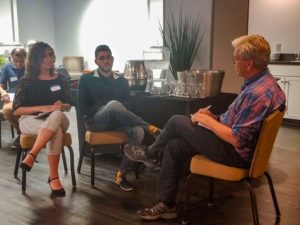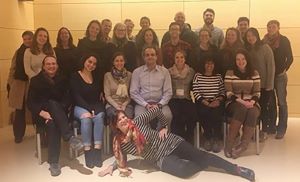Best Practices
The UREx SRN is a strong advocate for the co-production of knowledge through collaboration and the publication of network findings. Since its inception, the UREx SRN has produced international, multi-institutional, and cross-sector works by various members in the network. A multi-modal mentorship model also developed organically via network research of collaborators and research fellows. Guidelines for best practices in collaboration, publication, and participation in mentorship relations are provided for guidance through each of these areas.
Collaboration and Inclusion Guidelines
The Collaboration and Inclusion Guidelines were developed to foster and support an operating climate that maximizes collaboration, trust, and inclusivity throughout the network and acts as a mechanism by which information, ideas, and concerns can be voiced, shared, and appreciated across the network. Collaboration promotes flexibility and opens up new ways of thinking while also requiring commitment and mutual participation.

Authorship & Publication Policy
The Authorship and Publication Policy provides general principles, criteria, and procedures for determining authorship as well as publication policies. Integrity and the responsible conduct and reporting of research are essential for maintaining public trust in the research enterprise, and for community benefit from research discovery.
Note that the preferred method for citing UREx in publications is: “This work was supported by the National Science Foundation (NSF) Cooperative Agreement 1444755, the Urban Resilience to Extremes Sustainability Research Network (UREx SRN).”

Multi-modal mentorship is the aspect of the UREx SRN that encourages multi-directional mentorship among official advisors, collaborators, postdocs, students, and peers. Throughout the network’s existence, many mentor-protégé relationships have been formed resulting in research, reporting, and publication on urban flooding, coastal storms, regional droughts, and extreme heat waves. By observing and querying these successful interdisciplinary research relationships, the UREx SRN developed and embraced a multi-modal mentorship model. This form of mentorship was judged to be successful by both mentors and mentees.
The multi-modal mentorship tools can be used by any person involved in a research network or large, multi-investigator research project who seeks guidance on establishing an effective mentorship experience.

The New School, New York City
Multi-modal Mentorship Model Contributors: Nancy Grimm, David Iwaniec, Allain Barnett, Olga Barbosa, Lelani Mannetti, Sam Markolf, Yeowon Kim, Peter Groffman, John Kominoski, Javier Navarro, Vivek Shandas, Ken Kunkel, Nasir Ahmad, Mike Chester, Zoe Hamstead, Cliff Davidson, Genesis Alvarez Rosario, Evelyn Gaiser, Lauren McPhillips, Vivian Verduzco, Jason Sauer, Stephen Elser, Melissa Davidson, Elizabeth Cook, Heejun Chang, Timon McPhearson, Tischa Muñoz-Erickson, Agustín Robles Morua, Kristen Whitney, Yaella Depietri, Darin Wahl, Katinka Wijsman, Bart Orr, Robert Hobbins, Matt Feagan, Maryanne Rozance, Andrew Ballinger, Kaethe Selkirk, Pani Pajouhesh, Alison Cook-Davis, Kristi Eustice, Emily Key.
Data Policies and Procedures
The Data Policies and Procedures page describes processes for creating accounts, uploading and managing data in eRAMS, data security, as well as creating Working Group (WG) and Task Force (TF) pages. Refer to this page for instructions on managing UREx-related data and best practices for data management: https://data.urexsrn.net/policies-and-procedures/.


